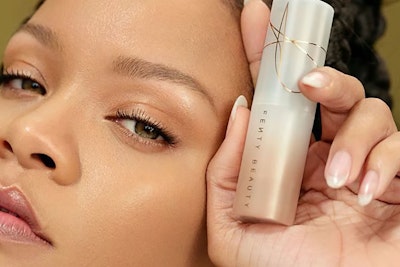Fenty Beauty
Inclusive beauty brand, founded by Rihanna

Fenty Beauty's Sustainability Rating
Poor
Ingredients
Fenty Beauty and its parent company, LVMH, have committed to avoid certain ingredients to lower its environmental impact, including parabens, phthalates, other petrochemical-based ingredients, uncertified palm oil or palm oil-derived ingredients, PFAS, microplastics, and harmful suncare ingredients. However, Fenty Beauty's brand-level ingredient commitments are not available on the US version of its website, and it still uses many ingredients that pose a significant threat to the climate, including microplastics, other petrochemical-based ingredients, and uncertified mica. Its products incorporate bio-based and/or biodegradable ingredients. Fenty Beauty doesn't report having any product or company-level certifications.
Containers & Packaging
Fenty Beauty doesn't discuss its packaging materials at the brand-level. We hope for more transparency from large brands. Its parent company, LVMH, has made efforts to reduce virgin plastic overall. However, based on its parent company's reporting, Fenty Beauty relies on petro-based plastics for its packaging, of a virgin or unknown source, which greatly increases its emissions and waste footprint. Fenty Beauty hasn't made any efforts to concentrate its products or minimize its containers, which increases shipping emissions and packaging volumes.
Energy & Water Use
Fenty Beauty's parent company, LVMH, shares information on its overall energy strategy. It uses a majority of renewable energy to power its operations, offices, and storefronts. It has targets for expanding its use of renewable energy to 100% by 2026. It implements energy efficiency and water conservation measures. Fenty Beauty has a global production span, which is standard for the industry.
Refill & Reuse
Fenty Beauty offers refills, but puts them in packaging that is unidentified or otherwise difficult to dispose of, which adds to landfill waste. It doesn't offer any take back programs for its product containers. It offers bulk sizes for some products, which may help reduce packaging waste. It provides recycling and/or disposal guidance for some of its products.
Slow Consumption
Fenty Beauty offers seasonal products or frequent releases, which can encourage overconsumption and production of excess inventory.
Marketing
Commons is still evaluating this brand's marketing emails.
Transparency & Reporting
Fenty Beauty doesn't appear to have a sustainability page or centralized source of relevant information. We expect more accountability from large brands. Its parent company, LVMH, publishes a detailed annual report with a clear, impact-driven strategy and progress reporting. Its last annual report was published in 2024. Fenty Beauty shares a complete list of ingredients used in its products, on a per product basis.
Emissions Tracking
LVMH, Fenty Beauty's parent company, internally measures and publicly reports its company-level emissions in partnership with, or with auditing from, a third party. It includes a breakdown by scope and vertical, and identifies its top driver of emissions. The last reporting period was 2024. In its most recent update, its estimated emissions footprint was 8,058,318 tons CO2e. This is larger than the annual emissions of many countries.
Targets & Offsets
LVMH, Fenty Beauty's parent company, has SBTi-approved emissions reduction targets for the medium-term (5-10 years), long-term (10+ years), short-term (1-5 years). It has reported on its progress within the past year, and is on track for some of its targets, but not its scope 3 targets, which are the largest impact. Commons couldn't find evidence that this brand offsets any emissions.
Supply Chain & Labor
LVMH, the parent company of Fenty Beauty, doesn't publish information about its supply chain partners. It publicly shares a supplier code of conduct, which disallows unauthorized subcontracting, prohibits child labor, prohibits forced labor, ensures the right to collective bargaining, includes environmental clauses. Its code of conduct doesn't ensure a living wage or establish grievance mechanisms. LVMH doesn't have a stated policy of regularly auditing its supply chain partners. This may increase human and environmental risks.
Advocacy
LVMH, Fenty Beauty's parent company, doesn't openly disclose its climate-obstructive trade association memberships. It's a member of 1 large climate-obstructive trade associations: Personal Care Products Council. It isn't a member of advocacy organizations advancing climate policy. It employs state lobbyists with few fossil fuel aligned clients. It didn't donate more than $100k to climate-obstructive candidates or PACs from 2018-2024.
Fenty Beauty has a Poor rating due to an overall lack of sustainability efforts and disclosures at the brand-level. We expect more reporting and transparency from a brand of its size.
Commons found that this brand uses many ingredients that pose a significant threat to the climate, including microplastics, other petrochemical-based ingredients, and uncertified mica. It uses primarily plastic packaging of a virgin or undisclosed source, which contributes greatly to waste production and excess energy use.
Its parent company uses a majority of renewable energy in production. It has SBTi-approved reduction targets, but it's not on track for its largest target. It doesn't share any information on its supply chain.
Our ratings are based on a scale from 1 (harmful) to 5 (best). How we rate →
https://lvmh-com.cdn.prismic.io/lvmh-com/aF5xp3fc4bHWix6S_LVMH_Commited_to_positive_impact-2024.pdf
https://fentybeauty.co.uk/pages/fenty-skin-ingredients
https://fentybeauty.com/collections/all-refillables
https://urd.lvmh.com/en/2024#_Toc193734073
https://sciencebasedtargets.org/target-dashboard
https://www.lvmh.com/en/commitment-in-action/a-purchasing-policy-that-lives-up-to-our-commitments
https://www.lvmh.com/en/ethics-and-compliance/lvmh-supplier-code-of-conduct
https://www.lvmh.com/en/ethics-and-compliance/the-responsible-lobbying-charter
https://www.personalcarecouncil.org/join-pcpc/member-companies/
https://fminus.org/lobbyists/?_search=LVMH
https://www.fec.gov/data/browse-data/
Get Rewards
Earn for sustainable purchases
Commons rewards you for sustainable purchases from all our Top Rated brands, plus thousands of everyday purchases — from thrift stores to public transit.
Learn more about rewards ->







